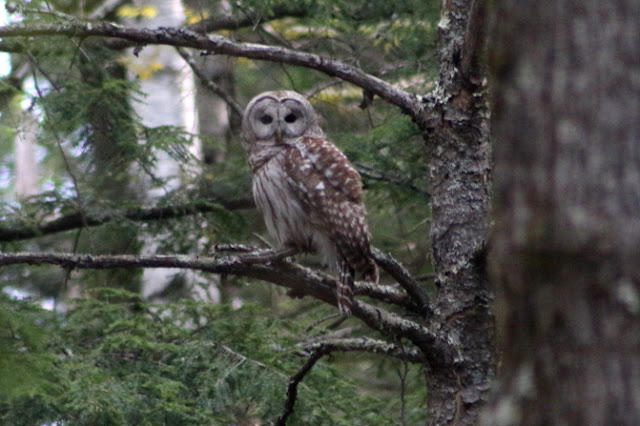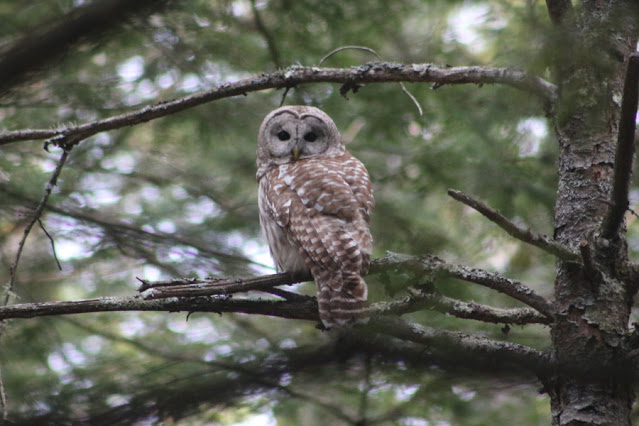I greatly enjoy the time I spend communing with nature as I walk the trails and paddle the waterways through our country's beautiful protected areas, and while doing so I am well aware of the impact I have on the residents who live there. Paddling along on a sunny day it's not uncommon to hear a turtle plop off the log where it was soaking up the sun to warm it's cold-blooded body.I was able to sneak by this painted turtle without disturbing it, but that's not always the case, especially when I don't see it before I hear the "plop".
Or to flush out a heron that was fishing unseen in the tall weeds along the shoreline where it had been stalking a frog or a fish, waiting for it to come within range of it's lightning-fast neck and long, accurate beak, hoping to bring dinner home to the chicks in the rookery.A great blue heron stalks its prey.
Even when alone and walking quietly it the woods it's clear I can't help but cause a disturbance; often it's just a red squirrel that chatters angrily, or a blue jay warning it's flock of an intruder - those are relatively minor annoyances to these animals.
Who's in my forest?
But sometimes it's a white-tailed deer that gets interrupted from it's breakfast or a hawk that felt it needed to abandon its observation post - these interfere with food intake and cause the animal to expend more energy, both of which are particularly detrimental in winter.
This week it was two encounters with an owl that told me of my impact. In the first interaction I disturbed a barred owl which flew across the trail I was hiking on. The bird landed in a tree ahead of me not too far off the trail which gave me the opportunity to watch it as I passed. I walked on slowly to not disturb it again, and was able to see it at various points as I went by. Each time I had a clear look at it I could see it was staring right at me, swiveling its neck around as I went by. Here's the first angle where it is looking sideways over its left shoulder.
As I walked, it tracked me; when I was directly beside it the owl had turned its head farther around to the left.
At my last line of sight it had rotated it head 180 degrees and it was looking straight backwards over it tail.

I felt good that I had passed without it feeling the need to move farther off into the woods, but still, it had to start its hunting procedure again.
These encounters aren't rare; I regularly spook an owl that flies off a perch right beside a trail which makes me think they use the clear sight lines along a trail to monitor a larger area, and to take advantage of the open trail for their wide, three-and-a-half foot wing span when they swoop down to capture their prey. So just as deer, moose, and fox take advantage of the easy travel along human's trails, we do provide some benefit to the animals in the forest. Still, this week I got a clear reminder of how just a simple walk can potentially impact the lives of the forest.
I was actually running along a little used trail when I was suddenly started by a chipmunk that must have been collecting seeds near the trail - when disturbed, chipmunks make a mad dash through the leaves to their nearest hiding hole, letting out a loud chip-chip-chip on the way. That alone wasn't significant, but as soon as it ran, an unseen barred owl on an overhead branch spread its wings and soared, silently, off into the forest.
That made me wonder: how long had that owl been stalking that chipmunk, waiting for it to be in the perfect position for the owl to swoop down with a high probability of intercept? Now it will have to find a new hunting spot where it expects there will be prey, and then wait long enough for the little critters to forget it flew in and expose themselves again.
This time of year the owl was probably a male which is now out hunting single-handedly to provide for an entire family. It's his job to bring home dinner for the chicks as well as the female who stays in the nest with her brood. Taking that one meal away from the family could mean the difference between an owlet surviving or not. We seem to have a pretty healthy rodent population after last year's big acorn crop, so he'll probably be able to provide for the family, but it's the kind of moment that makes one stop and think.
The New Hampshire Fish and Game Department and the US Fish and Wildlife Service have created a tool that lets trail owners and planners of new trails assess how their trail will affect wildlife. Anyone can access the tool which is made available through the University of New Hampshire's mapping system Granit. You can learn more about "Trails for People and Wildlife" here.
Those rustling sounds made by the chipmunks and squirrels scurrying around on the forest floor are pretty loud right now as the leaves are really crisp due to lack of rain. We've had nothing in the past week to either water the rapidly growing plants nor wash the pollen out of the air. At least we've enjoyed some great hot summer weather, as have those pollen-producing trees - in just a few days the leaves blossomed into full summer foliage.
There are no leaves on this dead tree which fell into the lake several years ago and for the past few summers has been the home of a pair of Eastern Kingbirds that's raised a family there:
 |
| Easter Kingbird (Tyrannus tyrannus) |
The parents are back, and the faithful nature-observers that monitor the area will let us know if the birds use the nest again this year.
 |
| Last year's nest needs a spring make-over. |






No comments:
Post a Comment